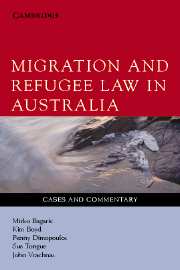Book contents
- Frontmatter
- Contents
- Detailed table of contents
- Table of cases
- Table of statutes
- 1 Thinking about migration law and national borders: An aspirational benchmark?
- 2 Introduction to Australian immigration law
- 3 Family and interdependency visas
- 4 Business and investment and skill-based visas
- 5 Temporary visas
- 6 Miscellaneous visas
- 7 Common visa requirements
- 8 Introduction to Australian refugee law: The Refugees Convention in Australian domestic law
- 9 Convention grounds
- 10 Persecution
- 11 Well-founded fear of persecution
- 12 Limits on protection of refugees: Cessation, exclusion exceptions and protection by another country
- 13 Cancellation of visas
- 14 Judicial review
- 15 Migration and human rights
- Index
5 - Temporary visas
Published online by Cambridge University Press: 05 June 2012
- Frontmatter
- Contents
- Detailed table of contents
- Table of cases
- Table of statutes
- 1 Thinking about migration law and national borders: An aspirational benchmark?
- 2 Introduction to Australian immigration law
- 3 Family and interdependency visas
- 4 Business and investment and skill-based visas
- 5 Temporary visas
- 6 Miscellaneous visas
- 7 Common visa requirements
- 8 Introduction to Australian refugee law: The Refugees Convention in Australian domestic law
- 9 Convention grounds
- 10 Persecution
- 11 Well-founded fear of persecution
- 12 Limits on protection of refugees: Cessation, exclusion exceptions and protection by another country
- 13 Cancellation of visas
- 14 Judicial review
- 15 Migration and human rights
- Index
Summary
Overview
Most travel or immigration to Australia is not permanent. Many people wish to come to Australia to pursue short- and medium-term objectives. To facilitate this, there are a large number of temporary visa classes in areas such as employment and business, tourism and education, and for people wishing to visit relatives and friends. Most people who come to Australia on a temporary basis provide a net economic benefit to the nation. They nearly always inject overseas money into the Australian economy and normally do not become a net resource drain on the community, given that they are rarely eligible to any form of welfare or government health care. Thus, the criteria for temporary visas tends to be less restrictive than for permanent visas. In this chapter, we examine some of the main temporary visa categories.
Temporary workers
There are a range of temporary visa categories for temporary workers. ‘Temporary’ in this sense ranges from working tourists to people who wish to stay in Australia for a period of years. Temporary workers and businesspeople can be employer-sponsored or independent.
Working holiday and electronic travel authority
The two most liberal temporary work and business visas are Working Holiday (Temporary) (Class TZ) and Electronic Travel Authority (Class UD).
The criteria for these visas are examined further in the textbook, Migration and Refugee Law: Principles and Practice in Australia, at sections 8.2.1 and 8.2.2.
Temporary business entry (Class UC)
Sub-class 456 (Business (Short Stay))
Sub-class 457 (Business (Long Stay))
These visas enable people who have skills that are in demand in Australia towork temporarily in Australia.
- Type
- Chapter
- Information
- Migration and Refugee Law in AustraliaCases and Commentary, pp. 126 - 164Publisher: Cambridge University PressPrint publication year: 2006



